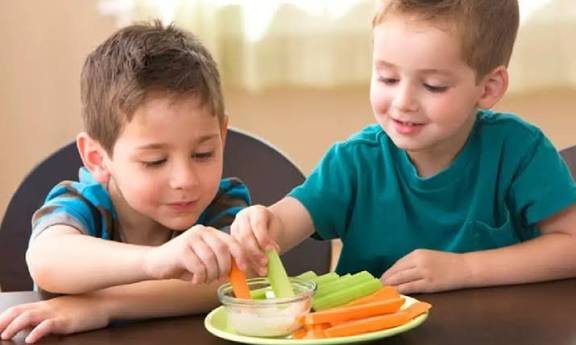Our children are growing up in a world full of competition. The pressure of academics and competitive environments has narrowed their world. Children, who should be running and playing freely in the sun and rain, are now confined indoors by computers and mobile phones. On one side, lifestyle changes have limited their freedom, and on the other side, unhealthy eating habits have surrounded them with foods high in fat and low in nutrition. These food patterns not only affect children’s physical health but also pose challenges to their mental well-being especially memory power. This has become one of the biggest challenges children face today. Memory is essential not just for studies but for every step of life. So, how can we improve children’s memory power? What changes should be made in their diet and lifestyle?
Let us look for answers to all these questions.
“Some children have the ability to answer multiple questions instantly. For example, if asked the number of a particular verse in a chapter of the Thirukkural, they can immediately recite the correct verse. Is it right to train children this way?”
It is fine if a child can recite the correct verse from the Thirukkural when asked from any chapter. However, care must be taken to ensure the child does not come under stress. It is important that a child remains a child. If the Thirukkural is learned joyfully, there is no problem. But it should never be forced upon them. The full capacity of the brain can indeed be used, but whatever the child does must be done happily. Parents should not pressure children with demands like “You must do this… you must achieve that.”
“What is IQ?”
IQ refers to the measurement of a person’s intelligence. The average IQ level is around 106 for East Asians, 100 for white populations, and 85 for black populations. For Indians, the average IQ level is about 82–85. (It is known that both Albert Einstein and Stephen Hawking had IQ levels of around 160.) Intelligence is directly connected to the brain. It depends on how the brain functions and how efficiently it works.

“Is forgetfulness different in adults and children?”
The needs of children and adults are different. A child’s brain is in a stage where it can absorb anything. Therefore, if the child has no brain damage, forgetfulness occurs only due to lack of attention. Memory has three stages registration, retention, and recalling. If a child is inattentive and keeps running around, that behavior must be corrected. In general, whether for adults or children, it is not necessary to remember everything. What we truly need to remember must be practiced repeatedly. For example, when asked, “A, B… what comes next?” we immediately answer “C”. How do we know that? Simply because we have repeated it many times, and it has stayed in memory.
“Why do children experience forgetfulness only in studies, and how can it be corrected?”
Forgetfulness may occur if certain illnesses have caused damage to the brain. The brain has specific regions related to memory, such as the temporal lobe and the limbic circuit. If these areas are affected during childhood due to illness, memory problems may occur, and they can even persist into adulthood. In some cases, forgetfulness may also be hereditary.
Parents often worry during exam times, saying: “The child tells us that nothing they studied is staying in memory, Doctor…” Even a good student may feel anxious that they have forgotten everything they learned. Usually, this fear comes from exam anxiety the worry that unknown questions may appear. But if a child cannot recall what they studied, the real reason is that they did not study deeply or properly in the first place. That is why some children keep studying until just minutes before the exam begins. The solution is to teach lessons in a way that children clearly understand, while ensuring they focus properly. If the problem persists and the child continues to suffer from forgetfulness, the brain must be examined for possible issues such as genetic disorders, birth-related blood vessel damage, epilepsy, or brain lesions. These needs to be treated appropriately. If the problem is due to learning difficulties, then targeted training and support can help overcome it.
“Does forgetfulness in childhood continue into adulthood?”
Forgetfulness in children during early years is usually due to lack of attention. It will only continue into adulthood if there is some kind of brain damage.
“How to improve memory?”
To improve memory, attention must be given to the three stages already mentioned registration, retention, and recalling. When lessons are taught in a way that children can easily understand, they will naturally remember them better. For example, if a rhyme is taught with hand movements, like singing “Wave your hand… wave your hand…” while waving hands, children grasp it quickly. Repetition also plays a key role if a child reads a lesson once or twice, they may retain only about 10%. But if the same lesson is read three times, memory retention can increase to 25%. Hence, children should be encouraged to revise lessons repeatedly. Some people use mnemonics, a technique of remembering by combining the first letters of words into a single word. Others use situational memory, where a fact is remembered by associating it with a real-life incident. There are many such methods, and children can follow whichever one works best for them.
“Do Gotu Kola and nutritional drinks help improve a child’s memory?”
Certain foods like Vallarai (Gotu Kola) may help enhance memory. Although there haven’t been large-scale scientific studies to prove this, the belief cannot be dismissed entirely. Between the ages of five and fifteen, the brain develops rapidly. During this period, giving Gotu Kola in moderation to children is considered beneficial. Research suggests that it may increase the number of neurons in the brain. Not only Gotu Kola but also turmeric is believed to have memory-boosting properties. As children grow, it is essential to provide them with the necessary nutrients to support brain development. Contrary to what advertisements claim, drinking nutritional beverages does not actually increase a child’s memory power.
“What are the foods that improve memory?”
There are no specific foods that directly increase memory power. However, consuming items like Vallarai (Gotu Kola) and turmeric in moderation may help enhance memory. Growing children should be given only the required amounts of nutrients such as proteins and carbohydrates — not more, not less.
“Children like to eat fast food. Does it affect memory?”
Junk food and fast food are not good for the brain. The fats and empty calories in them can harm memory power. Such foods are also unhealthy for children’s overall well-being. They can damage blood vessels, and as children grow into adulthood, these foods may even lead to problems such as stroke and heart attack. Therefore, it is best to avoid these kinds of foods. If avoiding them completely is not possible, children should be allowed to eat them only once a month.
“Is treatment necessary to improve memory?”
Practices like meditation, which help in focusing the mind, can improve memory. If a child is unable to remember lessons, the underlying problem must first be identified. Only then can the appropriate treatment be given that is the only way to enhance memory. If the child has no brain related issues and is otherwise healthy, then lessons must simply be taught in a way the child can clearly understand.
“Are there any exercises to improve memory?”
In brain function, the role of the left brain and right brain is important.
- The left brain helps with activities like speaking, reading, and writing.
- The right brain helps with creative activities like drawing.
For example, if the left brain says how to wear clothes, the right brain guides on how to wear them more stylishly. To improve memory, children can be given exercises like crossword puzzles and Sudoku. When they learn new things with curiosity, memory power tends to increase.

“Is there a connection between sleep and memory power?”
Yes, there is a strong connection between sleep and memory. A child’s brain gets proper rest only during sleep. There are two types of sleep: N.R.E.M sleep and R.E.M sleep. During R.E.M sleep, only the eyes move rapidly while the body remains still, and this is when we dream. One theory says that sleep helps to consolidate and organize the events of the day. Dreams occur only in deep sleep. Children need eight hours of deep sleep every day. Some children fall asleep as soon as they lie down this is also beneficial for improving their memory. For the brain to function well, sleep is absolutely essential.
“If grandparents or parents have memory loss, will it affect the children?”
If grandparents have memory loss, it does not directly affect their grandchildren. However, if the memory problem is due to brain damage or genetic disorders, then there is a possibility that children may also experience memory issues.
“How does brain development happen in unborn babies?”
The brain is formed within the first 70 to 80 days after conception. At that stage itself, the baby can sense everything. The only function that begins after birth is breathing. That is why it is said that a mother’s emotions affect the baby. If the mother keeps herself happy, the baby will also be happy because the baby’s world is the mother’s womb. Until birth, the brain continues to develop inside the womb. Even after birth, if you look at the baby’s head, the skull will not be fully closed. This is to allow space for brain growth. The skull closes only after the child turns two years old. That’s why newborn babies usually have a larger head compared to their body.

Foods that help Boost Children’s Memory!
Spinach (Palak), eggs, yogurt, fish, berries, turmeric, nuts, oats, beans, apples, avocado (butter fruit), and gooseberry (amla).
“Dark chocolate”, “broccoli”, cabbage, banana, pomegranate, okra (lady’s finger), and Vallarai (Gotu Kola) also help in brain development. Therefore, it is good to include these in the diet. If children do not drink enough water, brain functions will decline. Hence, children should be given five to six glasses of water every day.